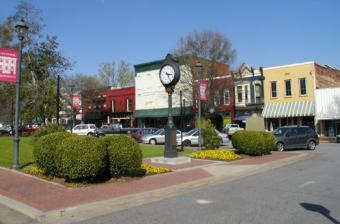
Section Branding
Header Content
Rural Leaders Seek Solutions
Primary Content

The effects of the recent recession could linger longer in rural counties than in metropolitan areas, and officials there are looking for ways to deal with the problem and put people back to work.
At a roundtable forum hosted by the U.S. Department of Agriculture at Augusta State University on Monday, community leaders from small towns in Georgia and South Carolina said they need financial incentives to keep small businesses open and to create jobs. Officials said they struggle to get federal grants since competition for them is too great. Larger cities, such as Augusta, got a direct allocation of funds from the federal stimulus package last year, but small towns had to apply in a competitive grant process.
The town of Washington, which has a population of 4,500 and is located about 55 miles northwest of Augusta, lost out. The town had tried to get a $6.5 million stimulus grant for a water treatment project, but federal workers handling the allocation told officials the money had run out, according to the mayor.
Unemployment in rural Georgia is higher than in metropolitan areas, where the economy is diversified. Rural economies depend heavily on agriculture and, often, a single industry. The people losing their jobs there often have knowledge of only one set of vocational skills. Also, unemployed people are often older, but not quite old enough for retirement.
One key to stabilizing rural economies, several officials said Monday, is to sustain small businesses. Low-interest federal loans are available to small business owners, but Willie Burns, mayor of Washington, says rural areas don't have the people and resources to sift through a complex bureaucratic procedure for the money.
"You don't have the intellectual capital to sit there and just go through all that paperwork and that just slows down the process, slows down the money coming in," said Burns. "Then a person who really does want to go into business, they're frustrated by that process and they just throw their hands up and give up."
Some state and local officials also said they want more investment in job training for workers, to teach them new vocational skills in preparation for new jobs when the economy does rebound.
Tags: Georgia, Augusta, unemployment, Washington, Georgia agriculture, U.S. Department of Agriculture, USDA, Augusta State University, Georgia economy, Georgia industry, rural economy, rural economies, Washington Mayor Willie Burns, Washington Georgia Mayor Willie Burns, South Carolina economy, South Carolina rural economy, Georgia rural economy, South Carolina agriculture, South Carolina industry, vocational skills, vocational education, USDA Rural Development, rural unemployment, Georgia rural unemployment, South Carolina rural employment
